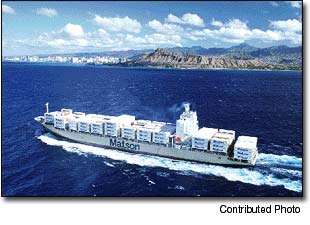O‘AHU — One of the key items on the agenda at the 28th annual Matson Navigation Company’s 28th annual Hawaiian Media Meeting On Tuesday in Honolulu was the U.S. Jones Act.
Matson CEO Jim Andrasick discussed his views on the Act which requires American owned ships transport goods between American ports.
In recent discussions about the Act, which coincides with several shipping laws enacted in the 1920s, a few government officials have attacked the rule citing cost and a restraint of free trade as key factors in their opposition.
According to Hawaii Congressman Ed Case (2nd District), the Act could cost families in Hawai‘i an annual some of approximately $3,000 per household. In addition, Case believes the Act costs the state an annual some of $60 million.
Other officials that oppose the Jones Act say that it is a restriction of free trade and is equivalent to a tariff on goods and services Hawai‘i brings in from the mainland.
Andrasick discussed his reasons why the Act should not be repealed.
“We want to address some misinformation that has been recently disseminated in association with Rep. Ed Case’s bills that call for exemptions or repeal of the U.S. Jones Act,” said the Matson CEO. “First of all, we can say that Hawai‘i’s congressional delegation, with the exception of Case, are united in their support of the law and how it ensures the nation maintains a healthy U.S. maritime industry. In addition, it’s important to recognize that the Jones Act is consistent with U.S. domestic transportation policy. Similar laws apply to other modes of transportation, such as air, truck and rail.”
Andrasick first discussed his view about the costs of the Act.
The Matson CEO believes that U. S.-flag carriers have higher operating costs than foreign-flag operators.
He, however, feels that these cost differentials have been vastly overstated.
“These are all costs that end up as wages in the pockets of U.S. citizens, rather than foreigners. But more importantly, these costs together account for less than 20 percent of Matson’s total costs,” said Andrasick. “While most associate the primary expense of operating an ocean transportation service is vessel-related, that perception is based on old transportation cost models when vessel-related costs dominated the equation.”
According to the Matson CEO, every other cost that Matson incurs would be the same for a foreign-flag operator; cost of fuel, stores, containers, machinery, vessel loading and discharge, customer service, computer tracking systems, local pickup and delivery, insurance, or overland transportation.
“The bulk of the costs of shipping are not impacted by the Jones Act and would be the same for all shipping companies, U.S. or foreign,” said Andrasick. “It is unlikely that the state’s shipping costs would be dramatically reduced by the entry of a foreign-flagged “low cost carrier” into the Hawai‘i trade.”
With regard to foreign interest, the Matson CEO states that if that interest can reduce these Jones Act-influenced costs by half, the result is a 10 percent overall reduction in total transportation costs, which may or may not be passed on to the Hawai‘i consumer.
Another important issue that Andrasick discussed with regards to the Jones Act is national security.
“It is important to understand that all Jones Act ships, containers, equipment, terminals, cargo tracking systems and employees who operate these systems will be made available to the U.S. military in times of emergency.” he said. “It is vital that Americans control Hawai‘i’s lifeline to and from the Mainland – not foreign governments.
Andrasick finished by stating, “Our vessels, our terminals and customer service systems are designed to meet Hawai‘i’s unique requirements. And our commitment extends to all of the state’s major ports, not just Honolulu.”
Business Editor Barry Graham can be reached at 245-3681 Ext. 251 or mailto:bgraham@pulitzer.net


